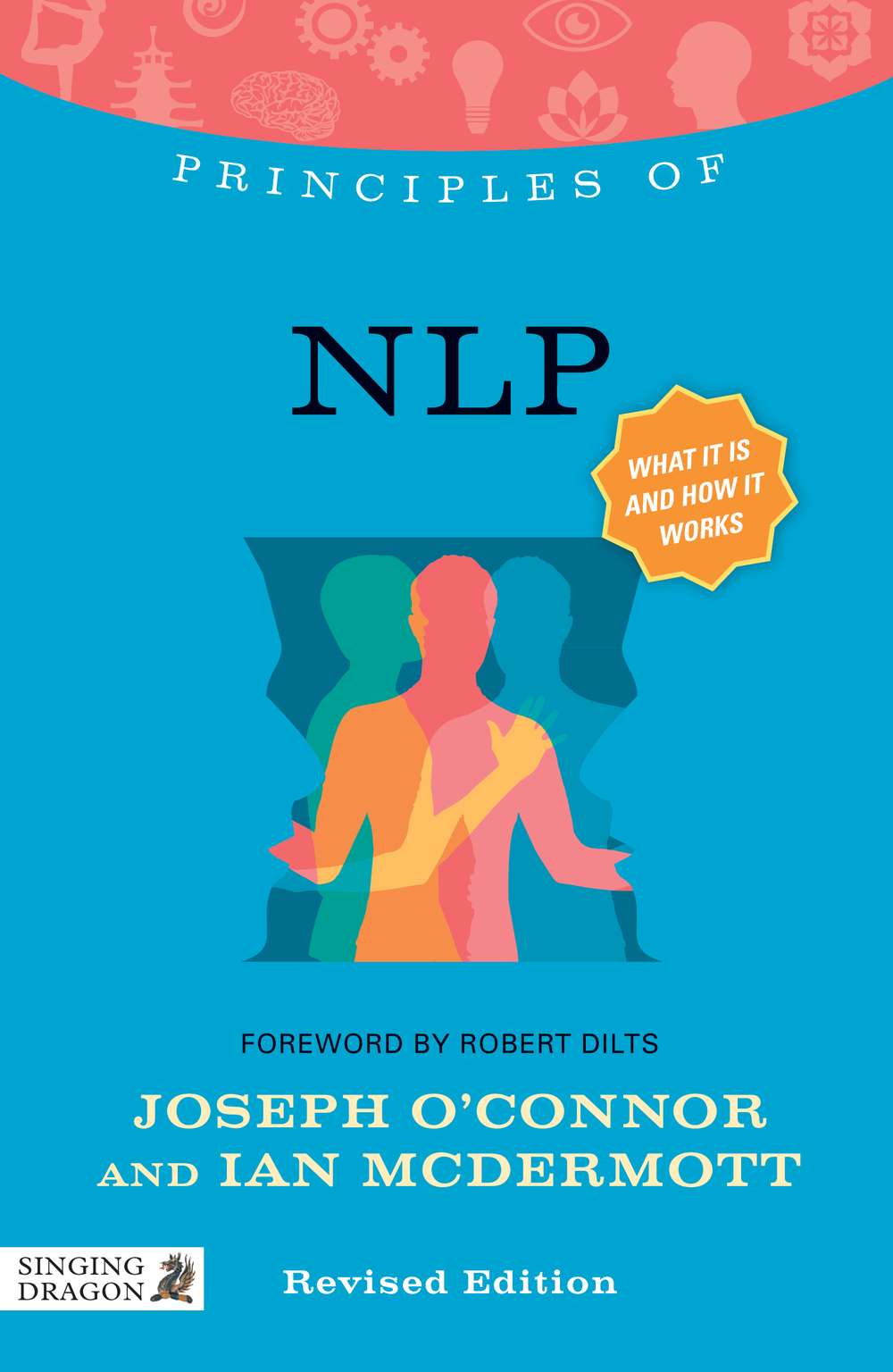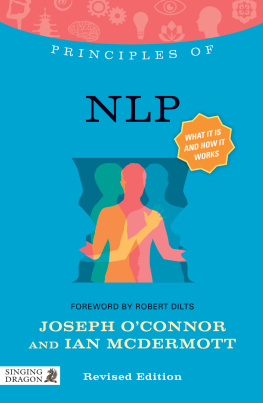
PRINCIPLES OF NLP
other titles in the series
PRINCIPLES OF
THE ALEXANDER TECHNIQUE
Jeremy Chance
PRINCIPLES OF
BACH FLOWER REMEDIES
Stefan Ball
PRINCIPLES OF
CHINESE HERBAL MEDICINE
John Hicks
PRINCIPLES OF
CHINESE MEDICINE
Angela Hicks
PRINCIPLES OF
THE ENNEAGRAM
Karen A. Webb
PRINCIPLES OF
HYPNOTHERAPY
Vera Peiffer
PRINCIPLES OF
KINESIOLOGY
Maggie La Tourelle with Anthea Courtenay
PRINCIPLES OF
REFLEXOLOGY
Nicola Hall
PRINCIPLES OF
REIKI
Kajsa Krishni Borng
PRINCIPLES OF
TIBETAN MEDICINE
Dr. Tamdin Sither Bradley
PRINCIPLES OF
NLP
What it is, how it works, and what it can do for you
Revised Edition
Joseph OConnor and
Ian McDermott
Foreword by Robert Dilts

London and Philadelphia
This edition published in 2013
by Singing Dragon
an imprint of Jessica Kingsley Publishers
116 Pentonville Road
London N1 9JB, UK
and
400 Market Street, Suite 400
Philadelphia, PA 19106, USA
www.singingdragon.com
First published in 1996 by Thorsons, an imprint of HarperCollins
Copyright Joseph OConnor and Ian McDermott 1996, 2013
Foreword copyright Robert Dilts 1996, 2013
The moral right of the authors has been asserted.
All rights reserved. No part of this publication may be reproduced in any material form (including photocopying or storing it in any medium by electronic means and whether or not transiently or incidentally to some other use of this publication) without the written permission of the copyright owner except in accordance with the provisions of the Copyright, Designs and Patents Act 1988 or under the terms of a licence issued by the Copyright Licensing Agency Ltd, Saffron House, 610 Kirby Street, London EC1N 8TS. Applications for the copyright owners written permission to reproduce any part of this publication should be addressed to the publisher.
Warning: The doing of an unauthorised act in relation to a copyright work may result in both a civil claim for damages and criminal prosecution.
Library of Congress Cataloging in Publication Data
A CIP catalog record for this book is available from the Library of Congress
British Library Cataloguing in Publication Data
A CIP catalogue record for this book is available from the British Library
ISBN 978 1 84819 161 7
eISBN 978 0 85701 136 7
Printed and bound in Great Britain
To our parents
CONTENTS
Foreword
It has been many years now since I first became exposed to the ideas and methods that were to grow into the field of NLP. In those early days, there were none of the quick, slick techniques that are associated with NLP today. Rather, there was a deep excitement about a new way to approach learning, choice and change. This excitement was fuelled by a set of unique and powerful presuppositions about human thought and behaviour that have been the generating principles of all of the developments of NLP that have followed.
The underlying mission of NLP has always been to unveil something about the deeper structure of being a human being and the process by which those invisible structures are transformed into the surface structures which determine how we interact with the world. The deep structure of NLP is its presuppositions.
By taking the NLP presuppositions as their starting-point, Joseph and Ian have emphasized the most generative aspect of NLP, and hopefully will help shift the focus of NLP interventions from simply behaviour and capability-level change to show its relevance for dealing with higher-level issues involving beliefs, identity and spirituality.
It is comforting to see the return to these roots of NLP after so many years of emphasis on surface results. I hope you are able to learn something more of the deep richness of NLP through the surface structure of this book.
Robert Dilts
ACKNOWLEDGEMENTS
Our thanks to all our teachers, and we want to give credit and recognition to John Grinder and Richard Bandler, co-developers of NLP, and to Robert Dilts, for contributing so much to the field. Milton Erickson is credited with embodying many of the principles in this book, and so we thank him for articulating them in action.
Thanks to our editor at Singing Dragon, Emily McClave, for bringing this edition into being.
As authors, we work together as equals, bringing together our skills into this project as we do in many others. Therefore the order in which the names appear on the cover of this book has no significance.
We hope this book furthers the growth and development of NLP in a positive way. We have learned much from writing it.
Introduction
The principles of NLP. It is a delight for us to write about them. NLP is practical, it is about experience your experience; what it is, not what it should be. It is about enriching your own world-view.
What is NLP? Its title gives one answer. Neuro refers to the mind and how we organize our mental life. Linguistic is about language, how we use it and how it affects us. Programming is about our sequences of repetitive behaviour and how we act with purpose. So NLP is about connection, for our thoughts, speech and actions are what connects us to others, the world and to the spiritual dimension.
This is a practical book, explaining how NLP translates into your everyday life. Although well grounded in psychological theory and research, NLP is first and foremost about action. It gives you more choices in your mind and body, and so frees you to explore spirit.
The starting-point of NLP is curiosity and fascination about people. It is the study of the structure of subjective experience. How do we do what we do? How do we think? How do we learn? How do we get angry? And how do outstanding people in any field get their results? To answer these questions NLP explores how we think and feel and studies or models excellence in every walk of life. The answers can then be taught to others. The goal is excellence for all.
NLP began in the early 1970s when Richard Bandler, a student of psychology at the University of California, Santa Cruz, began working with John Grinder, then Assistant Professor of Linguistics. Together they modelled three people: Fritz Perls, the innovative psychologist and originator of Gestalt therapy; Virginia Satir, the prime force behind family therapy; and Milton Erickson, the world famous hypnotherapist, whose ideas are continued in Ericksonian hypnotherapy. They also drew on the insights and ideas of many others, particularly Gregory Bateson, the British writer and thinker on anthropology, cybernetics and communications theory. Their first models dealt with verbal and non-verbal communication skills. Consequently, NLP has given rise to a trail of techniques that can be used both personally and professionally. They are used internationally in fields such as sports, business, sales and education, and enable us not only to reach out and influence others, but also to reach in and unify the different parts of our selves.
You will find these skills, and more, in this book. We have attempted to give you the process that created the techniques, so you can take the ideas and make them your own in the way that suits you best. NLP is a generative psychology. It is also the psychology of excellence. It has a vision of a world in which there is no shortage of excellence and where education is about helping everyone to be outstanding.
Next page














